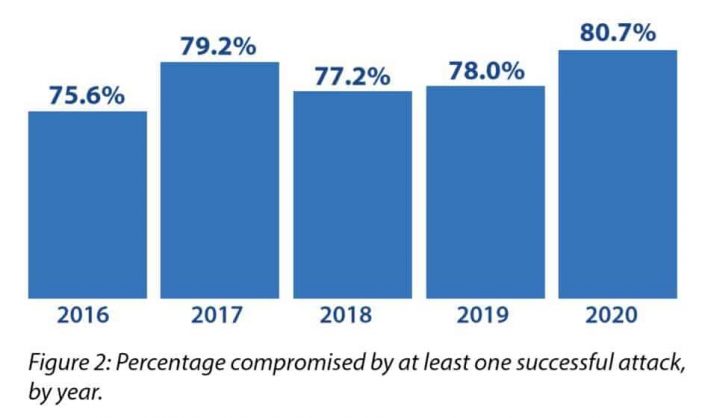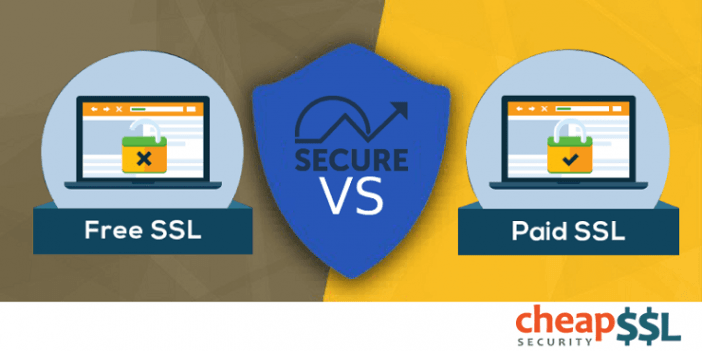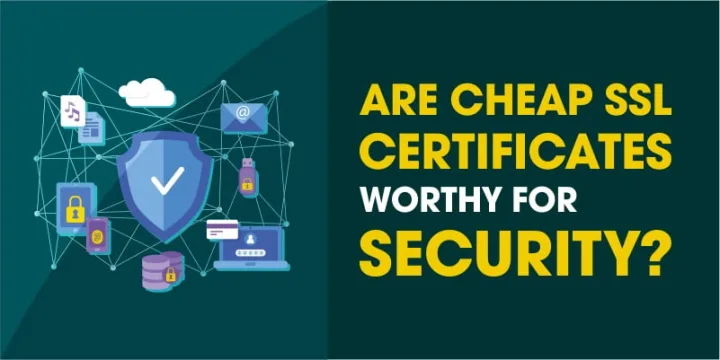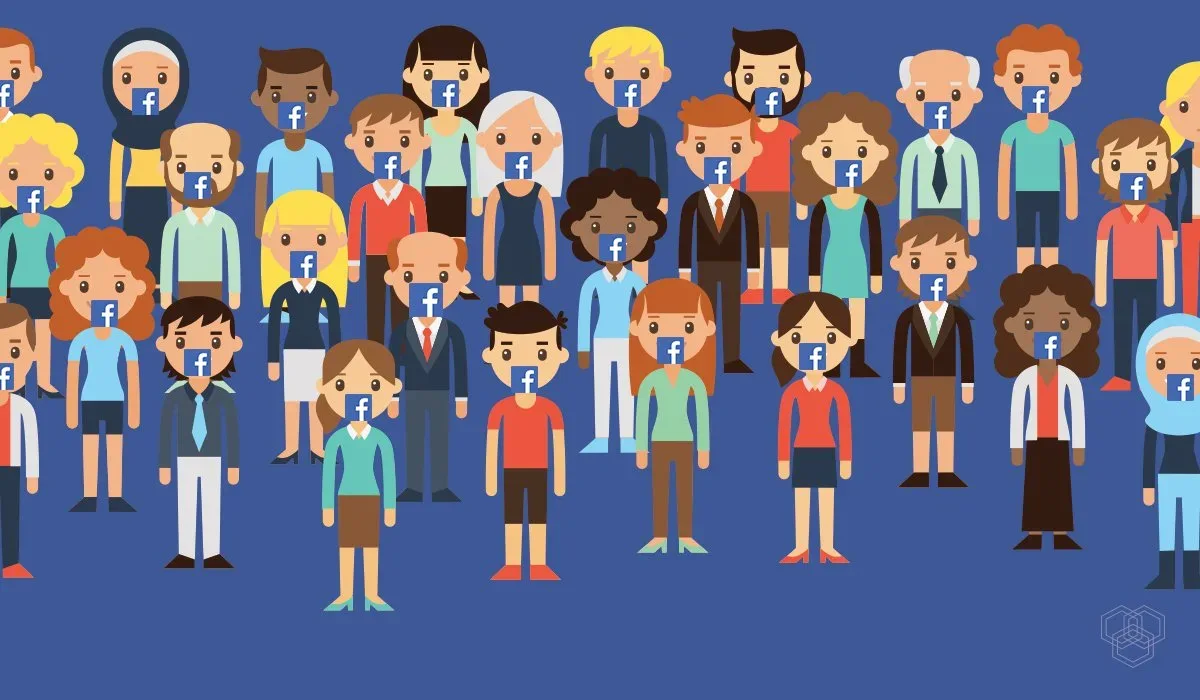In this digital era, where cyber crimes are on the rise, website owners and online visitors are concerned about their site securities and transaction securities, respectively.
The below graph indicates that the 2020 Cyber Threat Defence Report shows that the % of successful cyber-attacks has increased from 78% in 2019 to 80.7% in 2020.

A study by the University of Maryland suggests that hackers attack every 39 seconds.
All the above figures and statistics indicate that web security is not a choice or option; it has become a vital necessity. Firewalls, Anti-virus software, malware scans, etc., are all a part of these securities, but one strong security surpasses all of them. That is SSL security.
Your website is incomplete without SSL security. SSL (Secure Socket Layers) certificate works on encryption security for securing your website data and information.
Who needs SSL?
Nowadays, encryption security is no longer limited to e-commerce or financial institutions, but all websites need this security for protection against cyber-criminals. When customer-sensitive data is involved, it is best to use SSL security so that cyber-criminals can’t forcefully access this data for their evil intentions.
Google wants a secured web and hence is making HTTPS protocol (when SSL is installed, your site shows HTTPS in URL) a compulsion for gaining a boost in SEO ranks.
Fundamental Doubts: Which SSL is Preferable?
Many business owners have these questions in mind when they think about making their website SSL secure.
- If I am getting it for free, why pay for SSL?
- What is the difference between free and paid SSL?
- Which one is better? Free or Paid?
The choice between free and paid SSL depends on the business owner’s requirements. Since all SSL certificates provide the same encryption security, i.e., 256-bit encryption, small business owners are skeptical about shelling out their hard-earned money because of the same protection level.
They are unaware that there is a vast difference between choosing a free SSL or opting for a paid one. Had there been no difference, business owners worldwide would be raising their hands for free SSL instead of opting for the paid version.
In this article, we will discuss some basics of Free SSL and Paid SSL and the critical differences between the two.
About Free SSL:
As the name defines, free SSL certificates don’t require any monetary payment. They can be quickly downloaded and are very easy and convenient to use. No validations are needed, and the business owner can get a free SSL certificate since one free SSL secures only one domain.
Basics of Free SSL:
- Available in Domain Validation only and provides only for a primary domain.
- Limited securities, so not ideal for medium or large businesses. Even small companies wishing to secure sub-domains can’t opt for free SSL
- Limited validity period (30 – 90 days), so frequent renewal is required.
- No technical support available due to its free availability
- Sometimes Free SSL has cyber-security issues too.
- These certificates don’t come with a warranty.
- These SSL certificates also help boost SEO
About Paid SSL:
Paid SSL certificates are available at a price and are issued and signed by a Certificate Authority (CA). They are available in all three validations like Domain Validation (DV), Organisation Validation (OV), and Extended Validation (EV). There are many cheap SSL certificate providers in the market.
Paid SSL certificates are best for e-commerce websites or large enterprises where many financial transactions occur. These websites collect sensitive information from their website users.
The best SSL certificates providers to buy the cheapest SSL certificates are:
- Comodo
- DigiCert
- Thawte
- ClickSSL
- GlobalSign
- GoDaddy
Basics of Paid SSL:
- They are available in DV, OV, and EV
- Multiple choices and options of Paid SSL
- They are legitimate and trustworthy.
- Their validity period is more extended, i.e., .27 months.
- They come with a warranty.
- They have experts who provide technical help.
- They help boost SEO
Now that you are aware of both these types of SSL basics, let’s move on to the differences between the two to decide which one scales higher.
Difference between Free SSL & Paid SSL:

The fact that nothing comes free in this world does not stand true for SSL certificates. But the free version has certain limitations compared to the paid version, which comes with lots of advantages and advanced features.
Differences:
| Free SSL | Paid SSL |
| They are available in only one validation, i.e., DV. | They are available in other higher validations, i.e., DV, OV, and EV. |
| They are valid for a maximum time of 3 months; hence frequent renewal is required. | They are valid for a year or two, saving the trouble of renewing the same frequency. |
| It is ideal for individual sites, blogging sites, and having a single website. | It is best for medium or large businesses and e-commerce businesses, where multiple websites are managed. |
| They secure the primary domain of the website. | They help secure domains, sub-domains, etc., depending on the type of SSL certificate installed. |
| There are no choices to select the SSL certificate, only Standard SSL. | There are multiple selection choices, like Wildcard SSL, Multi-Domain SSL, Multi-Domain Wildcard SSL, etc. |
| They don’t come with a warranty, and hence a victim cannot claim for the damage. | They have huge warranties, depending on the SSL certificate type; hence, they are powerful enough to protect your business against data breaches. |
| This SSL lacks technical support, and hence technical difficulties remain unsolved. | Expert helps is available 24/7/365 for queries related to SSL installation. |
| Since the necessary security level without higher validation is used for securing the website, the trust level is low. | Since organizations are validated and authenticated before SSL issuance for the website, the trust level is also high. |
| CA’s providing Free SSL only validates the identity of the website owner. | CA’s providing Paid SSL has all the resources to validate the organization’s authenticity, apart from validating the site owner’s identity. |
Why should Enterprises opt for Paid SSL?
The above differences clearly indicate that though Free SSL provides the same encryption level as Paid SSL, it still has certain limitations, as stated above. These limitations motivate the majority of enterprises to opt for Paid SSL.
One more threat that revolves around Free SSL is that even cyber-fraudsters use this SSL to lure business owners for their selfish benefits. Hence visitor’s trust sites have a Paid SSL certificate installed on them, and their business and website are validated by a trustworthy CA before SSL issuance. All these factors make Paid SSL a knockout winner and a perfect security solution for your website.
In a Nutshell:
Paid SSL helps in accelerating conversion rates because they come with high trust levels. In this challenging competitive era, many cheap SSL certificate providers provide SSL certificates at discounted rates.
You can select any CA and fulfill your SSL needs, but if you ask my opinion, Cheap SSL Certificates from Clickssl.net is a one-stop destination for all your SSL requirements.







Share Your Thoughts